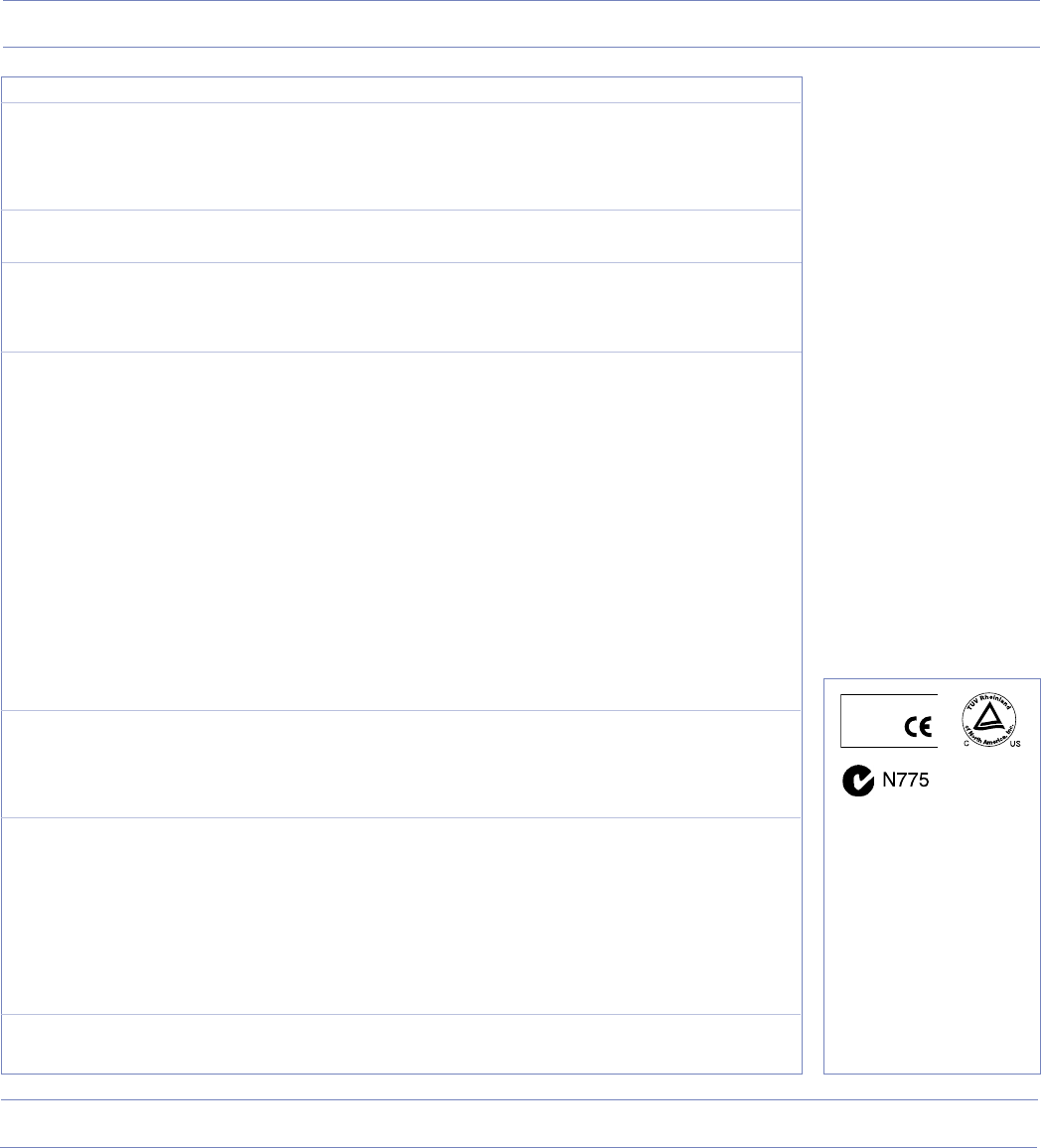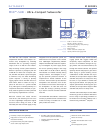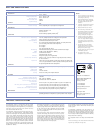
M1D-Sub specifications
architect specifications
meyer sound laboratories inc.
2832 San Pablo Avenue
Berkeley, CA 94702
T: +1 510 486.1166
F: +1 510 486.8356
techsupport@meyersound.com
www.meyersound.com
M1D-SUB - 04.116.001.01 C
Copyright © 2006
Meyer Sound Laboratories Inc.
All rights reserved
Operating Frequency Range
2
Frequency Response
3
Phase Response
Maximum Peak SPL
4
Dynamic Range
Horizontal Coverage
Vertical Coverage
Low Frequency
Type
Maximum Common Mode Range
Connectors
Input Impedance
Wiring
DC Blocking
CMRR
RF Filter
TIM Filter
Nominal Input Sensitivity
Input Level
Type
Output Power
6
THD, IM, TIM
Load Capacity
Cooling
Connector
Automatic Voltage Selection
Safety Agency Rated Operating Range
Turn-on and Turn-off Points
7
Current Draw
8
:
Idle Current
Max Long-Term Continuous Current (>10 sec)
Burst Current (<1 sec)
Ultimate Short-Term Peak Current Draw
Inrush Current
32 Hz - 180 Hz
35 Hz - 160 Hz ±4 dB
50 Hz - 120 Hz ±45°
130 dB
>110 dB
360°
Varies, depending on array length and configuration
Two 10" cone drivers with neodymium magnets
Nominal impedance: 4 Ω
Voice coil size: 2"
Power-handling capability: 400 W (AES)
5
Differential, electronically balanced
±15 V DC, clamped to earth for voltage transient protection
Female XLR input with male XLR loop output
10 kΩ differential between pins 2 and 3
Pin 1: Chassis/earth through 220 kΩ, 1000 pF, 15 V clamp network to
provide virtual ground lift at audiofrequencies
Pin 2: Signal +
Pin 3: Signal -
Case: Earth ground and chassis
Differential DC blocking up to maximum common mode voltage
>50 dB, typically 80 dB (50 Hz - 500 Hz)
Common mode: 425 kHz
Differential mode: 142 kHz
Integral to signal processing (<80 kHz)
0 dB V (1 V rms, 1.4 V pk) continuous is typically the onset of limiting
for noise and music
Audio source must be capable of producing a minimum of +20 dB V (10
V rms, 14 V pk) into 600 Ω inorder to produce maximum peak SPL over
the operating bandwidth of the loudspeaker
Two-channel complementary MOSFET output stages (class AB/bridged)
450 W total
<.02 %
4 Ω each channel
Forced air cooling over amplifier heatsink
PowerCon with looping output
Automatic
100 - 240 V AC; 50/60 Hz
Continuous 90 - 264 V AC; 50/60 Hz
0.41 A rms (115 V AC); 0.33 A rms (230 V AC); 0.42 A rms (100 V AC)
3.2 A rms (115 V AC); 1.6 A rms (230 V AC); 3.7 A rms (100 V AC)
5.0 A rms (115 V AC); 2.5 A rms (230 V AC); 5.8 A rms (100 V AC)
17 A pk (115 V AC); 8.5 A pk (230 V AC); 20 A pk (100 V AC)
15 A pk (115 V AC); 13 A pk (230 V AC); 15 A pk (100 V AC)
Equipped for two conductor twisted-pair network, reporting all
operating parameters ofamplifiers to system operator’s host computer.
Acoustical
1
Coverage
Transducers
Audio Input
Amplifiers
AC Power
RMS Network
The loudspeaker shall be a self-powered, sub-bass system
that may be deployed as part of a flown array or placed sepa-
rately in proximity to the mid-high M1D array. The transducers
shall consist of two 10-inch cone drivers (2-inch voice coil)
each rated to handle 400 AES* watts.
The loudspeaker shall incorporate internal processing elec-
tronics and a two-channel amplifier. Each amplifier channel
shall be class AB/bridged with complementary MOSFET output
stages. Burst capability shall be 450 watts total with nominal
4-ohm resistive load on each channel. Distortion (THD, IM,
TIM) shall not exceed 0.02%. Protection circuits shall include
peak and rms limiting. The audio input shall be electronically
balanced with a 10 kOhm impedance and accept a nominal 0
dBu (1 V rms, 1.4 V pk) signal (+20 dBV to produce maximum
SPL). Connectors shall be XLR (A-3) type male and female. RF
filtering shall be provided, and CMRR shall be greater than 50
dB (80 dB 50 – 500 Hz).
Notes:
Performance specifications for a typical production unit shall
be as follows, measured at 1/3 octave resolution: Operating
frequency range shall be 32 Hz to 180 Hz. Phase response shall
be ±45° from 35 Hz to 160 Hz. Maximum SPL shall be 130 dB
at 1 meter. Coverage shall be 360° horizontal. (Vertical varies
with array configuration.)
The internal power supply shall perform automatic voltage
selection, EMI filtering, soft current turn-on and surge sup-
pression. Powering requirements shall be 90 to 264 V AC line
current at 50 Hz or 60 Hz. UL and CE operating voltage range
shall be 100 V AC to 240 V AC. Current draw during burst shall
be 5 A at 115 V AC and 2.5 A at 230 V AC. Inrush current during
turn-on shall not exceed 15 A at 115 V. AC power connectors
shall be locking PowerCon with loop output.
The loudspeaker system shall incorporate the electronics
module for Meyer Sound’s RMS remote monitoring and
control system.
All loudspeaker components shall be mounted in an
enclosure constructed of multi-ply hardwood with a black
textured finish. The front protective grille shall be pow-
der-coated, hex stamped steel. Dimensions shall be 22.62"
wide x 13" high x 17.50" deep (575 mm x 330 mm x 445 mm).
Weight shall be 70 lbs (31.75 kg).
The loudspeaker shall be the Meyer Sound Model M1D-
Sub.
*Driven continuously for two hours with band-limited noise
signal having a 6 dB peak-average ratio.
1. The low-frequency power response
of the system will increase according
to the length of the array.
2. Recommended maximum operating
frequency range. Response depends
on loading conditions and room
acoustics.
3. Free field, measured with 1/3 octave
frequency resolution at 4 meters.
4. Measured with music at 1 meter.
5. Power handling is measured under
AES standard conditions: transducer
driven continuously for two hours
with band-limited noise signal
having a 6 dB peak-average ratio.
6. Amplifier wattage rating based on
the maximum unclipped burst sine-
wave rms voltage that the amplifier
will produce into the nominal load
impedance. Both channels: 30 V rms
(42 V pk).
7. No automatic turn-off voltages.
Voltages above 264 V AC are fuse
protected but may cause permanent
damage to the power supply.
Voltages below 90 V AC may result in
intermittent operation.
8. Current draw for a single
loudspeaker. Loop out not used.
Made by Meyer Sound, Berkeley, CA, USA
European Office:
Meyer Sound Germany
GmbH
Carl Zeiss Strasse 13
56751 Polch, Germany




